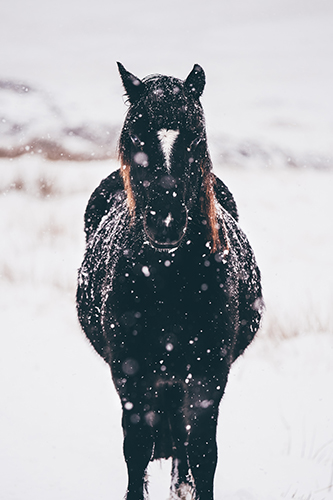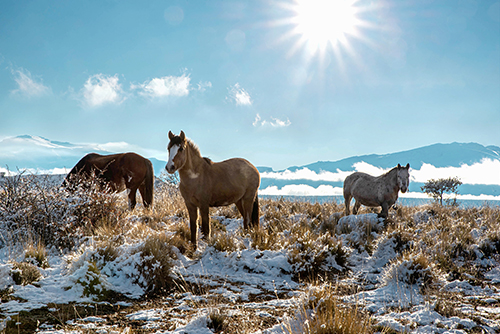Providing cold weather care for horses is essential, especially in East Tennessee where winters can be quite chilly.
Here are some tips for ensuring the well-being of your horses during cold weather:
Shelter: Make sure your horses have access to a well-insulated shelter or a three-sided run-in shed. This will protect them from wind, rain, and snow.
Blankets: Depending on the horse’s condition and the temperature, you may want to use horse blankets. Horses that are body clipped or worked hard enough to sweat will benefit from a blanket. Be mindful not to overheat them, as horses have natural insulation in their coats. It may be a good idea to only use them short-term, as placing a blanket on a horse with a heavy winter coat can compress the horse’s hair and reduce its natural insulating ability. Be sure to remove the blanket every few days to check for injuries and monitor horse’s body condition underneath.
Proper Feeding: Horses need more calories to stay warm in the cold. Adjust their feed accordingly and ensure they have access to clean, unfrozen water at all times. Contrary to popular belief, it’s hay, not grain, that is the best choice for helping a horse generate body heat. Forages are digested in the large intestine by bacterial fermentation, a process that generates heat and raises the horse’s core body temperature. Grain, which is digested in the stomach and small intestine, creates much less heat.

Water intake: The incidence of impaction (constipation) colic significantly increases during the coldest months and is often due to inadequate water intake and lack of exercise. Do not depend on snow to meet meet her daily water requirements. Not only does snow not provide enough water, but it also requires more energy to consume, and can chill old or debilitated horses. Although a horse’s water consumption varies depending on temperature, diet, and exercise, an average 1000-pound horse requires at least 10 gallons of water each day for maintenance.
Bedding: Provide deep, dry bedding in their shelter to help insulate against the cold ground.
Grooming: Regular grooming not only keeps your horse’s coat clean but also stimulates blood flow, which can help them stay warm.

Exercise: Encourage your horses to move and stay active to generate heat but avoid intense workouts in extremely cold weather. Winter is a wonderful time to ride and enjoy our horses, but it is critical that we follow a few common-sense strategies to meet the special demands of cold weather. Bundle up and enjoy the unique beauty of the season!
Hoof Care: Unless your horse must be shod, he will benefit from having his shoes pulled and going barefoot throughout the winter for two reasons. This first is that removing the shoes allows the foot to expand, especially in the heels, which in turn, increases circulation and improves the overall health of the foot. The second is that a horse’s bare hoof provides better traction on ice and snow than an iron shoe.
Health Check: Monitor your horse’s overall health during the winter, as cold weather can exacerbate existing health issues.
Deworming: Continue a regular deworming program, as internal parasites can affect your horse’s health year-round.
Check for Frostbite: Pay attention to the ears, tail, and lower limbs, as these areas are susceptible to frostbite.
